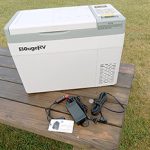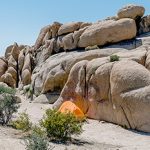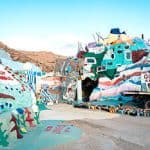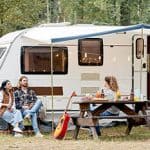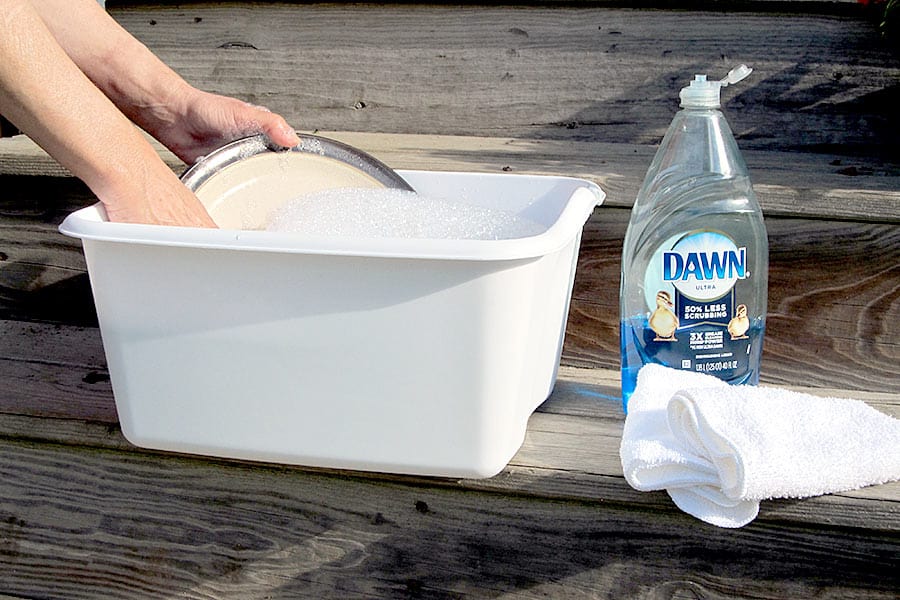
Camping is full of little adventures, and one of these is cooking in the great outdoors. But, what do you do with the dirty dishes after the cooking fun is done? You need to wash them, but how do you do that in a way that is safe for the environment?
Dawn dish soap is technically safe for camping. Still, even biodegradable soaps can harm the ecosystem if not disposed of properly. So when camping to reduce the impact you have on the environment, make sure to use and dispose of all soaps properly.
Before we can help you decide which soaps would be safest to use, we need to understand the difference between soaps and detergents. That way, you will realize why some soaps are better for camping. Read on to find out more about soap and our top recommendations for camping soaps and also some alternatives.
Dish Soap: The Basics
First, we need to understand what dish soap is made out of. Soap is a surfactant made from saponification, a process where oils or fats are combined with a base such as lye. (Lye, by the way, is most commonly made by mixing wood ash with water.)
Surfactants work by reducing what is called “surface tension” between two liquids, or a liquid and a solid. When you see water droplets on a waxy leaf, you see surface tension in action. If you spray a surfactant on the leaf, it will break the bonds holding the water together to loosen enough to break apart. Then, the water drops will disappear.
To put it simply—the surfactant in the soap loosens the grip dirt has on your dishes. So Dawn Dish Soap is a surfactant, right?
Well, yes and no.
What Is Dawn Dish Washing Liquid?
Soap is not the only surfactant. There are four types of chemical surfactants, and they don’t contain the same products as soaps. While soaps are typically made from some combination of oils and lye, detergents are made from a combination of natural and synthetic ingredients.
These are the main ingredients in Dawn Ultra Dishwashing Liquid Soap:
- Sodium Lauryl Sulfate
- Sodium Laureth Sulfate
- Lauramine Oxide
- Alcohol Denatured
- Sodium Chloride
- PPG 26
- Phenoxyethanol
- Methylisothiazolinone
So what is soap? What is a detergent? Wikipedia says, “Soap is created by mixing fats and oils with a base, as opposed to detergent which is created by combining chemical compounds in a mixer.”
Since dish liquids have synthetic ingredients, they may not be as environmentally friendly as some other choices. Read the ingredients on your specific brand to see what they include.
Ingredients in Ivory Soap
Although we could pick other soaps, we are choosing Ivory because it has fewer ingredients than others. Ivory lists the following ingredients for its original bar soap:
- Sodium Tallowate or Sodium Palmate
- Water
- Sodium Cocoate or Sodium Palm Kernelate
- Glycerin
- Sodium Chloride
- Coconut, Palm, or Tallow Acid
In other words, Ivory contains water, a variety of oils, salts, and glycerin, a liquid taken from plants. These ingredients are natural, not synthetic. Generally, soaps are made from natural ingredients, while most detergents contain ingredients not found in nature.
Are the Chemicals in Detergents Safe?
Good question. The answer is it depends. Most ingredients are safe for almost all people. Most of us eat and drink from dishes cleaned by detergents, and if they were not safe, we would get sick.
People can be allergic to specific ingredients in detergents. That is why you can find products that are free from allergens or hypoallergenic. Common allergens include phosphates, fragrances, and dyes, so dish soaps for sensitive skin avoid using them.
Another ingredient often used in detergents is methylparaben or paraben. Some studies have linked paraben to specific cancers, including breast and skin. However, the studies have not been conclusive enough for the FDA to label it as harmful.
However, some manufacturers have stopped using parabens due to reports of skin allergies with products containing a paraben. Most now offer a soap or detergent that is paraben-free.
How Can They Be Unsafe?
Although detergents are generally safe for people, that does not mean they are safe for the environment or some animals. The ingredients in most soaps are biodegradable, meaning they can be broken down by bacteria. If you toss kitchen scraps onto your compost pile, worms and bacteria will eventually break those scraps into compost.
However, some of the ingredients in detergents are non-biodegradable. Since bacteria cannot decompose them, they remain in the environment much longer. This inability to decompose can be harmful, especially to aquatic animals. Surfactants, you will remember, reduce surface tension. Their grease-cutting ability is excellent for getting stains out of clothes and off dishes.
But when that grease-cutter removes oils from animals that rely on it to protect them, it can be harmful.
What Are Some Possible Harmful Effects of Detergents on Fish?
High detergent concentrations in water can cause the following:
- The mucus layers that help protect fish from parasites, bacteria and diseases become weakened or destroyed.
- Fish have a reduced ability to breed.
- Fish eggs are more likely to die.
- Gills can suffer damage.
- Fish eggs can be destroyed—at concentrations as low as five parts per million.
- Decreased surface tension means that the fish can more easily absorb pesticides.
When detergent levels reach 15 parts per million, most fish will die.
Can Detergents Be Bad if We Still Have Plenty of Fish?
Not so fast, some people say. We use detergents every day, and most of our lakes and rivers are still full of fish. If these detergents were causing this much damage, we would have fewer fish.
Researchers concluded that soaps and detergents don’t pose significant risks to the environment. The researchers looked at 250 studies and found that the soaps and detergents we use do not have a negative impact on the environment.
If we look a little closer, we find two interesting facts. First, the researchers created this study “for the purpose of promoting the sustainable use of surfactants.”
Secondly, this conclusion is based on the proper use of the product as well as proper disposal and treatment. Once the detergents and soaps “have been through a proper treatment plant, the risks to the environment are very low.”
If you want to delve deeper into the facts of this study, you can go to the American Cleaning Institute website for a link to view the article. Or you can also find it at Taylor & Francis Online.
Since most of the detergent and soaps we use go down the drain and then make their way to a treatment plant, the water released into lakes, streams, and rivers have low levels of non-biodegradable ingredients.
Other Posts of Interest
- Hymer Aktiv Loft vs. Pleasure-Way Tofino: Which Is Right For You
- Do I Need To Sanitize My RV Fresh Water System? What You Need To Know
- The Cost Of Converting A Sprinter Van Explained
- What is Shore Power In An RV?
Dish Detergent and Camping
Now back to the subject of washing dishes. When we use dish detergent in our homes, the resulting water winds up usually going through a treatment plant, making it safe for aquatic wildlife. That is why it is perfectly okay to use various dish detergents at home.
When you are camping to state the obvious, your dirty water is not going into a treatment plant. So if you toss your dirty dishwater into a river (which, by the way, you should not do), the synthetic surfactants are also going in.
Before you say that the number of people camping is so low that a little soap can’t be harmful, consider how many people go camping every year. According to Statista, 41.67 million people in America, or should I say specifically the United States, engaged in camping in 2018. So when you find a secluded spot to pitch your tent, you are not alone. Other people are finding their secluded spot also.
If you and all those people were to toss their dish soap detergent into the nearest body of water, that could raise the level of synthetic surfactants to dangerous levels. With so many people camping, conservation groups have developed best practices for dealing with dirty dishwater.
Use the No Trace Principle When Cleaning Your Dishes
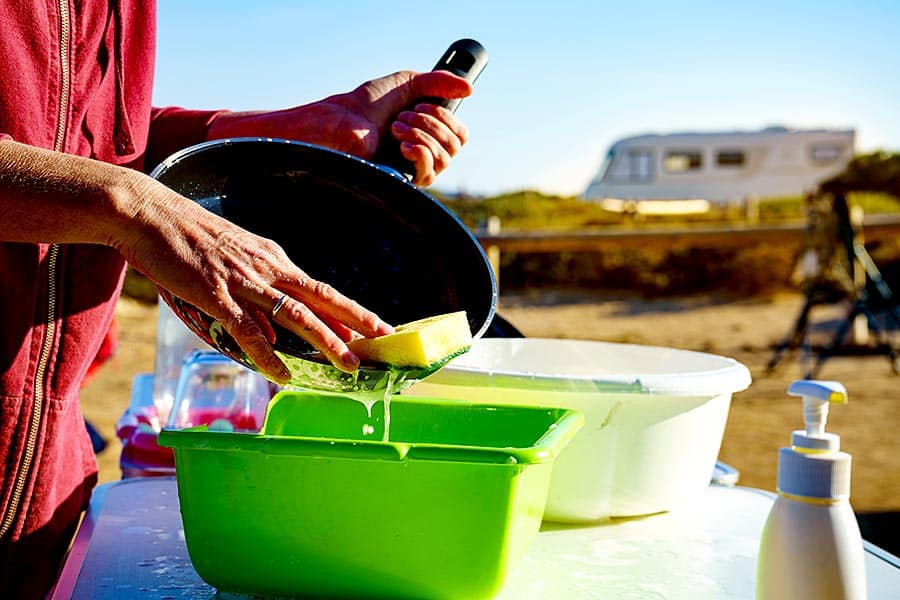
Cleaning your dishes and using soaps and detergents safely should be done following the Leave No Trace principles. These principles, designed by the Leave No Trace Center for Outdoor Ethics, are widely promoted by many camping organizations and practiced by campers.
These are the seven principles:
- Plan and prepare.
- Travel and camp where others also have.
- Properly dispose of your waste.
- Minimize your campfire’s impact.
- Leave what you find.
- Be respectful of wildlife.
- Be considerate toward others.
You can find out more by going to the Leave No Trace Center website. The principles are also well-established and found on popular outdoor sites as well as national and state parks.
Where You Should Dispose of Used Water
The third principle guides our actions when we are cleaning our dishes. “Pack it in, pack it out” is a common phrase used by campers. Follow these recommended guidelines to ensure you are doing your part to Leave No Trace.
Wash dishes (or yourself) at least 200 feet, or approximately 70 adult paces, away from a water source. This rule allows the soil to absorb the wastewater and filter out chemicals as it makes its way to the water source. Also, by working away from the shoreline, you are less likely to damage it.
- Gather water with a clean container.
- After washing, strain out food particles.
- Scatter the water away from the campsite.
- Put the food particles you strained into a bag so you can pack them out.
Some campers dig a 6- to 8-inch hole, toss their water and food particles in it, and then cover them with dirt. Do not do this with highly aromatic food that will attract wild animals, and make sure it is not right next to your campsite.
Planning Ahead Can Make Cleaning Dishes Easier
Cleaning dishes can be less of a chore if you plan your meals. Although eggs, bacon, and pancakes might sound delicious, you will wind up with many dishes to wash. Try to simplify your menu.
One way to do so is to plan one-dish meals, such as soups. For breakfast, a filling and easy option might be oatmeal. Campfire nachos, mac and cheese, even pizza—you would be surprised what you can cook in a frying pan. Canadian Food Network has an excellent selection of one-pot recipes you can try out.
What Are the Best Soaps?
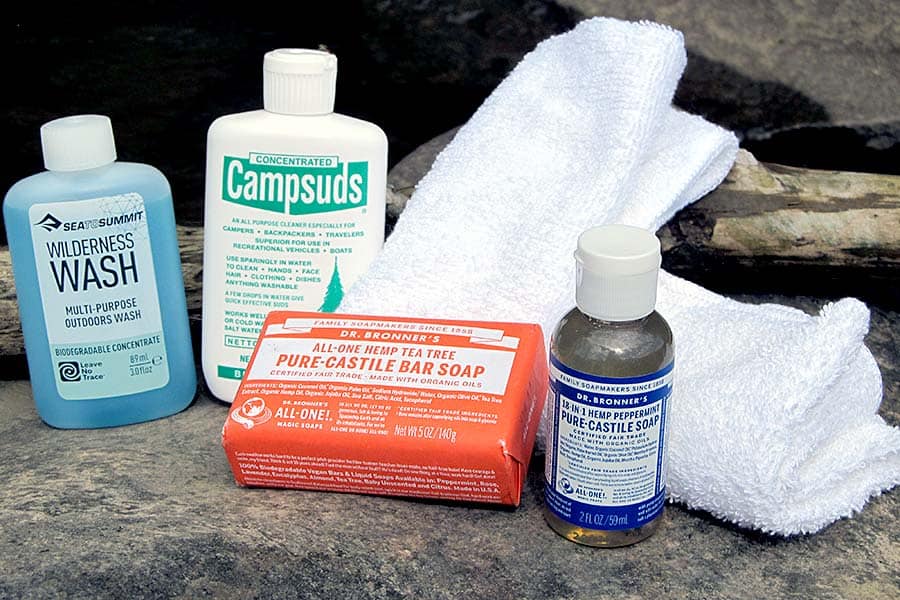
Trying to determine which dish soaps are the best to use can be difficult because of the overwhelming number of options. Number one—the soaps had to be biodegradable. Also, we looked for soaps that were concentrated and were multiple-purpose soaps.
Campsuds
Campsuds was the first product that marketed itself to campers, so many campers swear by it. According to their website, it is “made from vegetable-derived ingredients and a blend of essential oils.” Like all camping soaps, it is biodegradable.
- Super-concentrated—a few drops will do it
- Also multi-purpose—use for clothes, as a soap, and for washing dishes
- Lathers better than Dr. Bronner’s
It comes in a 4-ounce bottle, so if you plan to put it in your carry-on, you will have to transfer it to a smaller container.
Dr. Bronner’s Pure-Castile Liquid Soap
This Dr. Bronner’s soap is a perennial favorite with campers and those seeking natural soaps. The company prides itself on making organic, fair trade products and using all-natural, vegan ingredients.
- No detergents or foaming agents
- Multiple uses (the company claims there are 18)
- No added fragrance
- Clear ingredient list—water, organic olive, coconut, hemp and jojoba oil, citric acid, and Vitamin E
- Concentrated
This is an excellent, multi-purpose soap for cleaning your dishes, your clothes, and yourself. However, Dr. Bronner sells many soaps—so make sure you buy the unscented one for camping. Also, finding smaller sizes is not always easy. However, if you want a small amount, buy a plastic container and transfer it from the larger bottle.
Dr. Bronner’s also has bar soap; it gives you a rich lather and uses organic oils. The bar soap has no synthetic preservatives, detergents or foaming agents and is biodegradable.
Sea to Summit Wilderness Wash
This liquid soap is certified by the Leave No Trace organization, making sure that it meets the biodegradable standards.
- Concentrated formula
- Phosphate and fragrance-free
- Secure lid and sturdy plastic bottle to help prevent it from leaking in your backpack
- Multi-purpose—can be used on dishes and clothes
- It comes in three sizes, including a 3 ounce and a 1.4 ounce, so that it will meet flying regulations for carrying onboard.
The three-ounce bottle is plenty for a camping trip since you use it sparingly. A little will go a long way.
Some people prefer one soap over the other, try them to find your personal favorite.
Can I Use Bar Soap to Clean My Dishes?
Sure, you can. Just do not expect too many suds.
- Shave off a few slivers of soap and drop them into hot water.
- Stir the water around so the soap will melt. If you toss the soap in boiling water before eating, then the soap will have dissolved, and the water won’t be too hot.
- Dispose of dirty dishwater using the Leave No Trace Principles.
Need some advice on using Dr. Bronner’s bar soap? Click here for Lisa Bronner’s Dilutions Cheat Sheet.
Are There Substitutes to Detergents and Soaps?
People have been camping and living in the wilderness since before dishwashing liquids were invented. You can avoid using soaps and detergents altogether. These are several alternative methods:
- Wood ash and water. If cooking over a campfire, take some ashes and mix with some water to make a paste for cleaning. Use a little oil—it will make cleaning easier. Scrub the dishes, rinse off the wood ash and do a final rinse in boiling water.
- Sand. Get a handful of sand and rub it on your pots, pans, and other dishes. After, rinse and then put them in boiling water to sterilize them.
- Baking soda. Form a paste with baking soda and use it to scrub the dirt off then rinse dishes in hot water.
Using Plants to Make Soap
If you are going deep into the backcountry or are just interested in homesteading or survivalist methods, you can use various plants to make soap. You need to find plants with high levels of saponins.
The most common of these is Soapweed Yucca. If you run across the plant, cut off one leaf, strip the leaf apart until you have thin fibers, and swish the fibers in water to create homemade soap. Here is a video of how to use yucca to make soap.
Other plants include Mountain Lilac and Soaproot. Of course, spotting them requires plant identification skills. Or, you could use a plant identifying app. One that works well when camping is iNaturalist because of its ability to crowdsource and interact with other plant experts.
Bottom Line
There are a few options available for cleaning your camping dishes, everything from soaps specifically for camping to alternative methods that require no soap at all.
Regardless of which product you use to clean your dishes, even biodegradable products should not be dumped directly into lakes, rivers, or streams. Instead, practice Leave No Trace habits and dump your dirty dishwasher at least 200 feet away from freshwater sources.


